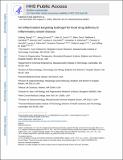An inflammation-targeting hydrogel for local drug delivery in inflammatory bowel disease
Author(s)
Ermann, J.; Zhou, A.; Hamilton, M. J.; Cao, B.; Korzenik, J. R.; Glickman, J. N.; Vemula, P. K.; Glimcher, L. H.; Zhang, Sufeng; Succi, Marc David; Traverso, Carlo Giovanni; Langer, Robert S; Karp, Jeffrey Michael; ... Show more Show less
DownloadLanger_An inflammation-targeting.pdf (669.7Kb)
PUBLISHER_POLICY
Publisher Policy
Article is made available in accordance with the publisher's policy and may be subject to US copyright law. Please refer to the publisher's site for terms of use.
Terms of use
Metadata
Show full item recordAbstract
There is a clinical need for new, more effective treatments for chronic and debilitating inflammatory bowel disease (IBD), including Crohn’s disease and ulcerative colitis. Targeting drugs selectively to the inflamed intestine may improve therapeutic outcomes and minimize systemic toxicity. We report the development of an inflammation-targeting hydrogel (IT-hydrogel) that acts as a drug delivery system to the inflamed colon. Hydrogel microfibers were generated from ascorbyl palmitate, an amphiphile that is generally recognized as safe (GRAS) by the U.S. Food and Drug Administration. IT-hydrogel microfibers loaded with the anti-inflammatory corticosteroid dexamethasone (Dex) were stable, released drug only upon enzymatic digestion, and demonstrated preferential adhesion to inflamed epithelial surfaces in vitro and in two mouse colitis models in vivo. Dex-loaded IT-hydrogel enemas, but not free Dex enemas, administered every other day to mice with colitis resulted in a significant reduction in inflammation and were associated with lower Dex peak serum concentrations and, thus, less systemic drug exposure. Ex vivo analysis of colon tissue samples from patients with ulcerative colitis demonstrated that IT-hydrogel microfibers adhered preferentially to mucosa from inflamed lesions compared with histologically normal sites. The IT-hydrogel drug delivery platform represents a promising approach for targeted enema-based therapies in patients with colonic IBD.
Date issued
2015-07Department
Harvard University--MIT Division of Health Sciences and Technology; Massachusetts Institute of Technology. Department of Chemical Engineering; Koch Institute for Integrative Cancer Research at MITJournal
Science Translational Medicine
Publisher
American Association for the Advancement of Science (AAAS)
Citation
Zhang, S.; Ermann, J.; Succi, M. D.; Zhou, A.; Hamilton, M. J.; Cao, B.; Korzenik, J. R. et al. “An Inflammation-Targeting Hydrogel for Local Drug Delivery in Inflammatory Bowel Disease.” Science Translational Medicine 7, no. 300 (August 2015): 300ra128_1–300ra128_22 © 2015 American Association for the Advancement of Science (AAAS)
Version: Author's final manuscript
ISSN
1946-6234
1946-6242